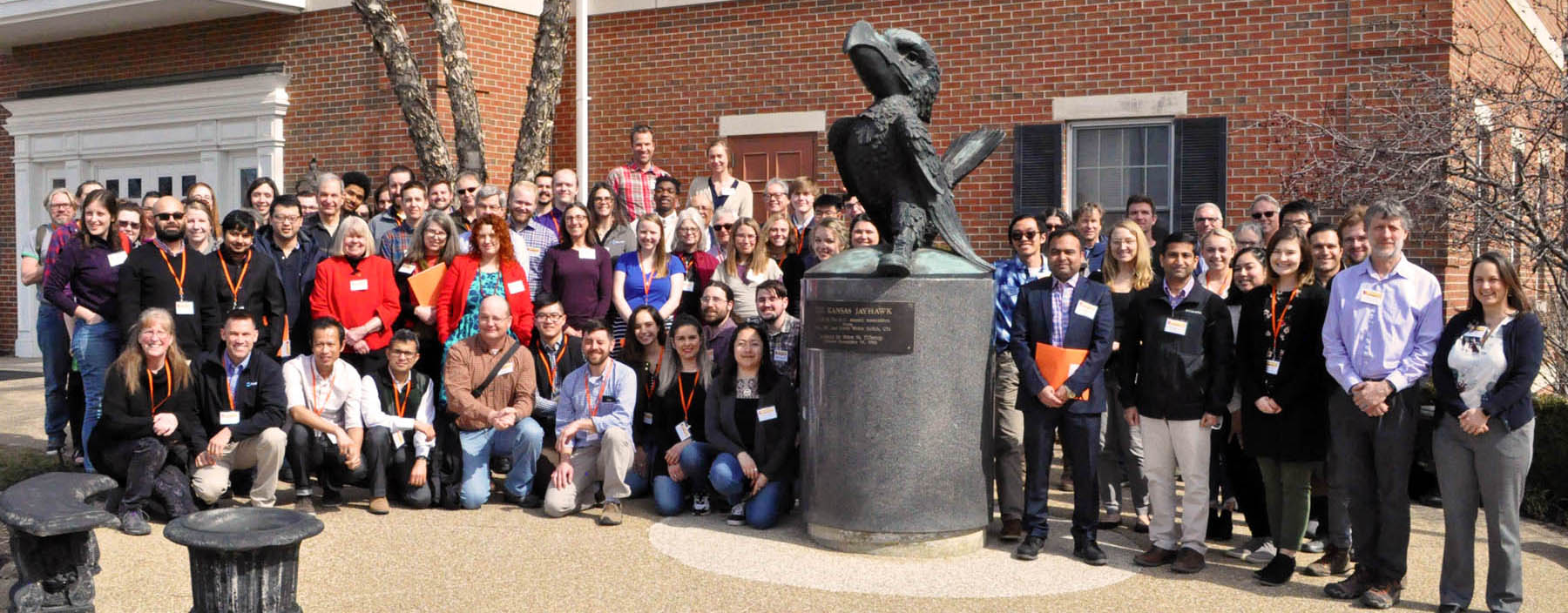
That's a wrap!
We said goodbye to the MAPS team with the recent submission of its final report to NSF. The team’s research shed light on a path for farmers to both feed the world and slow climate change.
A major Kansas NSF EPSCoR project concluded in December 2023. Titled Microbiomes of Aquatic, Plant, and Soil Systems across Kansas, or MAPS, this six-year initiative leveraged a $20 million award from the National Science Foundation to build research capacity in Kansas.
Since launching in 2017, the MAPS project enabled partnerships between dozens of faculty members and more than 70 students across the University of Kansas, Kansas State University, Wichita State University, Fort Hays State University, and Haskell Indian Nations University. It was further bolstered with a match of $2 million from the Kansas Board of Regents and $2 million from each institution.
End of an Era
The conclusion of MAPS also marks the end of an era in leadership at Kansas NSF EPSCoR. Kristin Bowman-James, distinguished professor of chemistry at KU, oversaw the project as its principal investigator. For the past 18 years, she led this and three similar initiatives as the director of Kansas NSF EPSCoR. Taking over the role is Belinda Sturm, professor of civil engineering and interim vice chancellor for research at KU.
Impact on Kansas
The mission of the MAPS project was driven by a vision that one day microbiomes can benefit ecosystems, much like how gut microbes aid digestion. In other words, the team envisioned using microbes to sustain crops in droughts, improve water quality, beef up carbon in soil, and solve other ecological challenges.
Despite a year-long shutdown during the pandemic, the team published more than 90 scholarly articles, making numerous key discoveries of high priority to Kansas.
For example, they designed an experimental approach to better understand vegetation areas bordering streams. These areas filter fertilizer and other materials that wash into streams during storms. Scientists knew little about the way materials move through these zones before this project. Now they know that these areas are highly efficient at removing ammonium, and they have the tools needed to learn more.
The team revealed why planting diverse crops instead of single species boosts agricultural yields. The study, which appeared in Nature Communications, shows how pathogens in the soil have a harder time thriving in diverse environments.
Another finding uncovered a link between a plants’ homesite and the specific local microbes. The results support a hypothesis known as the “home field advantage,” where the unique homesite microbes may represent microbial specialists that are linked to plant stress responses. These results shed light on the complex interplay between plant host and soil microbes.
The team’s agricultural soil studies revealed how microbes influence the steepness of the decline in soil organic carbon with depth. They showed how anaerobic microsites boost carbon in restored grasslands after ending row crop agriculture. They also found that modified rooting depths and precipitation regimes alter water flow patterns and fluxes of dissolved organic carbon throughout watersheds—insights that will aid in solving major concerns about the Earth’s changing climate.
As a result of this project, Kansas scientists have become more competitive in acquiring federal funding, leveraging the project to garner at least $35 million in additional funding. Research expertise was also bolstered because of the project’s four faculty hires at the participating universities.
Education saw enhancements as well. The team created two new college courses, shared science with 54 elementary classrooms, and uploaded 7 ecological videos to YouTube in English and Spanish. Summer programs supported 55 secondary teachers and 53 Native American interns. Moreover, the project’s mobile museum trekked 700 miles to share bilingual exhibits statewide.
“MAPS was a fantastic group to work with,” said Walter Dodds, university distinguished professor of biology at K-State and theme leader for the project. “The EPSCoR support for this project and others in the past has been much appreciated.”
While the MAPS project ends, Kansas NSF EPSCoR carries on with its eighth major initiative, called ARISE, which seeks to advance research on resilient, socially equitable infrastructures.
About Kansas NSF EPSCoR
Despite its clunky acronym, NSF EPSCoR stands for a clever strategy by the U.S. National Science Foundation known as the Established Program to Stimulate Competitive Research. With bipartisan congressional support, EPSCoR spurs innovation and opportunity in traditionally underfunded regions of the country—like Kansas.
